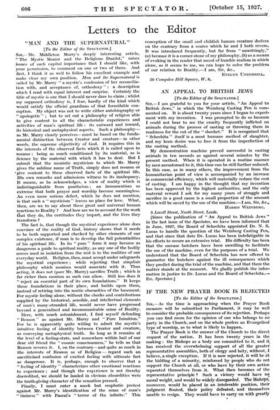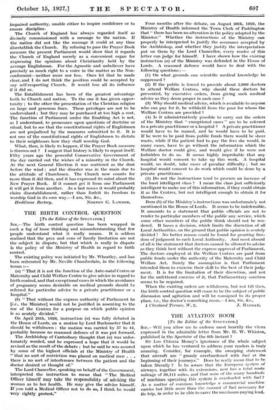IF THE NEW PRAYER BOOK IS REJECTED
[To the Editor of the SPECTATOR.]
SIR,—As the time is approaching when the Prayer Book measure will be submitted to Parliament, it may be well to consider the probable consequences of its rejection. Perhaps you can find room for the opinion of one who belongs to nd party in. the Church, and on the whole prefers an Evangelical type of worship, as to what is likely to happen.
The Prayer Book is the answer of the Church to the direct request of the nation. It has been twenty years in the making : the Bishops as a body are committed to it, and it: has received the overwhelming support of all the greatei representative assemblies, both of clergy and laity, without, I believe, a single exception. If it is now rejected, it will be it the bidding of a minority, reinforced by people who do not support the Church at all, or who have by their own action separated themselves from it. What then becomes of the representative principle ? Such a victory would have mt moral weight, and would be widely disregarded. The Bishops, moreover, would be placed in an intolerable position, their judgment flouted, their policy defeated, and themselves unable to resign. They would have to carry on with greatly
impaired authority, unable either to inspire confidence or to ,ensure discipline.
The Church of England has always regarded itself as divinely commissioned with a message to the nation. If the nation did not like the message it could at any time disestablish the Church. By refusing to pass the Prayer Book measure the present Parliament would show that it regards the Church of England merely as a convenient organ for expressing the opinions about Christianity held by the average Englishman. For the Agnostic and unbeliever have precisely as much right to a voice in the matter as the Non- conformist—neither more nor less. Once let that be made clear, and I do not think the position could be accepted by any self-respecting Church. It would lose all its influence if it did so.
The Establishment has been of the greatest advantage both to Church and nation. To the one it has given oppor- tunity ; to the other the presentation of the Christian religion on large and generous lines. These privileges are not to be undervalued ; but they may be purchased at too high a cost. The function of Parliament under the Enabling Act is not, as I understand, to pronounce upon questions of doctrine or ritual, but to see that the constitutional rights of Englishmen are not prejudiced by the measures submitted to it. It is not one of the constitutional rights of Englishmen to dictate to their neighbours how they shall worship God.
What, then, is likely to happen, if the Prayer Book measure is thrown out ? I suggest that history is likely to repeat itself. Fifty years ago the powerful Conservative Government of the day carried out the wishes of a minority in the Church. At the next General Election it was scattered as the dust before the wind ; and the disaster was in the main due to the attitude of Churchmen. The Church now counts for more than it did then, and it has expressed its mind about the New Prayer Book. If it cannot get it from one Parliament it will get it from another. As a last resin t it would probably claim disestablishment, rather than forfeit its freedom to worship God in its own way.—I am, Sir, &c.,



















































 Previous page
Previous page